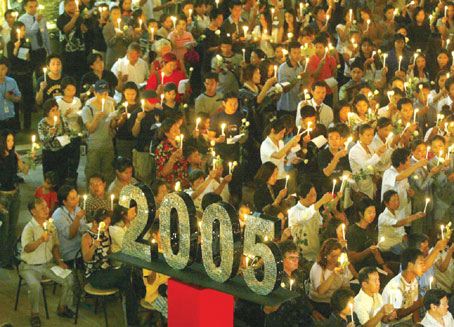
|
Prayer Time (Tehran)
|
|
Dawn: 5:45
Sunrise: 7:15
Noon: 12:08
Evening: 17:25
|
|
Weather Guide
|
|
|
SAT |
SUN |
Tehran: |
|
|
High: |
11 oC |
11 oC |
Low: |
4 oC |
3 oC |
|
|
|
Athens |
6 |
6 |
Ankara |
0 |
-4 |
Paris |
6 |
3 |
New Delhi |
9 |
9 |
Rome |
4 |
3 |
Riyadh |
10 |
9 |
Frankfurt |
3 |
1 |
Cairo |
13 |
11 |
Kuwait City |
8 |
8 |
Karachi |
13 |
11 |
Copenhagen |
1 |
0 |
London |
4 |
3 |
Moscow |
-8 |
-7 |
Madrid |
0 |
0 |
Vienna |
5 |
1 |
|
|
Identification
|
|
Published by the Islamic Republic News Agency (IRNA)
Address:
Iran Cultural & Press Institute, #212 Khorramshahr Avenue Tehran/Iran
Managing Director: Mohammad T. Roghaniha
Executive Editor: Amin Sabooni
Editorial Dept. Tel: 8755761-2
Editorial Dept. Fax: 8761869
Advertising Dept. Tel: 8753119, 8757702, 8733764
Internet Address:
www.iran-daily.com
E-mail Address:
iran-daily@iran-daily.com
|
|

|
|
Rafsanjani Waiting for Response Of Elite
TEHRAN, Dec. 31--State Expediency Council Chairman Akbar Hashemi Rafsanjani on Friday said if the elite reached the conclusion that he should run for presidency, he would do so.
In a meeting with the chairman and members of the Association of Parliamentarians in the Post-Islamic Revolution Era, Rafsanjani said, "At this juncture I do not intend to run for presidency. But if the elite concluded that I should run for presidency at this historic moment, God willing, I would enter the electoral scene."
According to ISNA, head of the association, Mostafa Naseri-Zanjani, also addressed the meeting and said the next president should be a person who can mobilize all the capacities of political factions and the sympathizers of the Islamic Revolution, and adheres to the constitution and the progressive notion of supreme jurisprudence.
He noted that the future chief executive must transcend factional considerations.
Naseri-Zanjani further said that under the sensitive international conditions and at a time when enemies of the Islamic Revolution are plotting against it, the next president should be a well-known figure on the international scene and enjoy a broad support base on the home front.
Addressing Rafsanjani, Naseri-Zanjani said, "We respect all the political factions and people who have nominated themselves for presidency. However, at this juncture we feel that you have a previous experience of presidency and are a clear choice for president this time around. Therefore, if you consider it expedient, enter the electoral scene so that the people and sympathizers of the Islamic Revolution would have no worries."
|
|
|
National Geographic Inserts “Persian Gulf” in Online Atlas
TEHRAN, Dec. 31--British Broadcasting Corporation Radio on Friday reported that following extensive protests of the Iranian people and government, the American publication “National Geographic” replaced “Arabian Gulf” in its online atlas by Persian Gulf.
According to IRNA, BBC Radio added that National Geographic eliminated the name Arabian Gulf in its atlas.
“However, in an explanatory note beside the name Persian Gulf, it says Persian Gulf is the name most widely used throughout history, although some people prefer the name Arabian Gulf," it said.
National Geographic, which is among the most reputable geographic institutions of the world, in a statement announced that it only used the name Persian Gulf after seeking the advice of governmental and academic sources as well as organizations and political parties. It did not specify these sources.
The radio also said that the change has been implemented in the Internet version of the atlas and the change in print version will be carried out in the next edition of the atlas.
Moreover, the explanatory note which described the Iranian islands of Greater and Lesser Tunbs and Abu Moussa as occupied by Iran and claimed by the UAE has been deleted. The names 'Qeis' and 'Abu Shaeeb' are also not used next to the names of the Iranian islands of Kish and Lavan either.
Two or three days before making these corrections, Iran's Foreign Ministry Spokesman Hamid Reza Asefi declared that National Geographic had sent a letter of apology to Iranian officials, stressing that it would correct its mistakes.
Since six months ago, when National Geographic published its atlas containing the wrong name, the Iranian people and government launched extensive protests. These protests were unprecedented in the sense that Iranian expatriates also joined hands with the people at home to voice their objections to the national Geographic.
|
|
|
In Remembrance
BANGKOK, Thailand, Dec. 31--Thai people hold candles to honor the memory of those who died after Asia's tsunami during a gathering on New Year’s Eve, in Phuket province about 862 km (536 miles) south of Bangkok, Dec. 31. The death toll from the Asian tsunami has exceeded 120,000. (Reuters Photo)
|
|
|
Saudi Forces Kill Suspected
Al-Qaeda Leader
RIYADH, Saudi Arabia, Dec. 31--Saudi security forces have killed 10 suspected Al-Qaeda militants in two days of clashes in the capital, including a Yemeni thought to be the terror group's leader in the country, officials said Thursday.
The clashes, in which two people on the country's most-wanted list were also killed, occurred before and after two car bombings against security targets in the capital on Wednesday that left two other people dead, AFP reported.
Saudi forces killed seven militants in a shootout late Wednesday that came just an hour after bombings at the interior ministry and a special forces base, a ministry statement said.
The other three were killed in a firefight that began late Tuesday and continued overnight, said the statement carried by the official SPA news agency.
The ministry identified the two most-wanted militants as Saudis Sultan Bjad Saadun Al-Otaibi and Bandar Abderrahman Al-Dakhil.
A security source said a Yemeni among the dead, Ibrahim Ahmed Abdel Majeed Al-Reemy, was believed to be the actual leader of the Al-Qaeda in Saudi Arabia.
Reemy, who did not figure on the most-wanted list, is a "big shot in Al-Qaeda and is believed to be the link between the organization in Saudi Arabia and bin Laden himself," the source said.
Since May 2003, Saudi Arabia has been swept by a wave of violence which the authorities blame on the Al-Qaeda network of Saudi-born bin Laden.
More than 100 people have died and hundreds more been wounded in the attacks, many of which have targeted foreigners. The bomb attacks in the oil-rich kingdom, prompted security alerts elsewhere in the Persian Gulf region and sent world oil prices rising.
|
|
|
Navy Commander:
US Only Interested in Oil
TEHRAN, Dec. 31--Commander of the Navy Rear Admiral Abbas Mohtaj on Friday said the US will do anything to gain control over the region's oil resources, which are its only friends in the Middle East.
Speaking to ISNA, he added, "America has not concluded any accord with the regional countries and its presence in the region is merely aimed at protecting its oil interests and the interests of the Zionist (Israeli) regime in order to prevent the spread of Islamic fundamentalism."
He stressed that America's Greater Middle East Initiative threatens Arab countries more than anybody else.
"This is while Arab countries are not aware of this threat and naively believe that the US only threatens Iran," he said.
Asked about the UAE's claim over the ownership of the Iranian islands of Greater and Lesser Tunbs and Abu Moussa, he said, "Resolution of such disputes requires special political and diplomatic means. It is not necessary to engage in a war for removing each and every form of ambiguity. Of course, border disputes are common worldwide."
Noting that the name “Arabian Gulf” was first used to refer to Persian Gulf by a British national while pursuing the divide-and-rule policy, the Navy commander noted that the revival of the same name by the American publication “National Geographic” is a manifestation of the same policy.
Mohtaj announced that two Australian and British warships left Iranian waters last month after the Navy issued them warnings.
"Extraterritorial forces always admit that Iranian naval forces are fully vigilant. Most of the time, they pay attention to the warnings issued by the Navy. These two warships left Iranian waters after the Navy gave them warnings," he said.
|
|
|
Call for Preventing Discord Among Conservatives
TEHRAN, Dec. 31--A prominent member of State Expediency Council Ali Larijani on Thursday said certain sections of the media and politicians wish to sow seeds of discord in the conservative camp.
Speaking to reporters, Larijani added, "They want to create a rift between (SEC Chairman Akbar Hashemi) Rafsanjani and the fundamentalists."
He called on the print media to prevent the spread of discord among political factions, IRNA reported.
"Since the beginning, everybody appreciated him (Rafsanjani) and he has always appreciated the fundamentalists. So it is better to avoid discord," he said.
The SEC member noted that the overall political climate seems to be sound on the threshold of the presidential election.
"This implies that a democratic system is governing the country," he said.
Asked whether he would run for president if Rafsanjani were to become a candidate, Larijani said, "Don't hurry.
Let the right time come. Many things could happen. The final decision will be made after negotiations among all fundamentalist currents.
I have always said that I support the fundamentalists and do not wish to create any problem for them."
|
|
|
Basque Parliament Supports Distance From Spain
MADRID, Spain,
Dec. 31--The parliament of Spain's autonomous Basque region on Thursday backed a plan to loosen ties with the central government in Madrid ahead of a regional referendum scheduled for next year.
Under the "Ibarretxe Plan," brainchild of regional government chief Juan Jose Ibarretxe, the northern region would become a "territory freely associated with Spain" rather than simply an autonomous region, AFP reported.
Radical Basques want outright independence but they are in a small minority.
The proposal was carried after a handful of pro-independence radicals shelved plans to reject the proposal.
Opening the debate, Ibarretxe said earlier that "all the Basques, all those who live and work here, are going to decide on their future. Nobody will decide on their behalf."
Ibarretxe also denounced the armed separatist Basque group ETA, which has killed some 800 people in the past four decades.
However, even if the coalition wins the vote and the proposal then gains popular approval in a regional referendum, it would still need to be approved by the national Spanish Parliament in Madrid.
The Madrid government and mainstream Spanish parties fear the plan would lead to the dismemberment of a country whose constitution, while recognizing regional autonomy, stresses the indivisibility of the Spanish state.
Spain's Prime Minister Jose Luis Rodrigo Zapatero said in an interview published Wednesday his government could extend regional autonomy within the constitution, while not accepting the Ibarretxe Plan.
|
|
|
Rohani Undecided
SEMNAN, Dec. 31--Secretary of Supreme National Security Council Hassan Rohani on Friday said he was undecided about running for presidency, expressing his interest in knowing the people joining the race.
Talking to IRNA, Rohani added that some political groups, MPs and personalities have urged him to participate in the presidential election, scheduled for May 2005.
Rohani referred to the slander of well-known personalities as an "unwanted move".
"All people who may nominate themselves for presidency must be respected," he said.
He also said that the upcoming elections in Iraq are very important.
“The elections must be held in a healthy and comprehensive manner. This will ensure the security of Iraq and the entire region," he said.
The SNSC chief reiterated that Iran does not seek to interfere in the affairs of other countries, including Iraq.
"On several occasions, we have asked people who claimed Iran had interfered in Iraq’s internal affairs to present evidence, but to date no proof has been forthcoming," he said.
|
|
|

|

|
|
|

|
|
Working With Pakistan
By S. Sadeghi
Despite the fact that our relations with Pakistan have had their fair share of ups and downs, overall ties both before and after the 1979 revolution have been good.
We are two Muslim neighbors, which have historic, cultural and civilizational commonalities. One could also assert that lingual and cultural interaction is more endurable than other prominent features.
For example, many learned Iranians are acquainted with the poetry of Eqbal Lahouri, the renowned Pakistani poet. By the same token, the people of Pakistan are familiar with the works of towering Iranian literary figures including Ferdowsi, Sa'di, Hafez and Nizami.
So, the onus is on the officials and policymakers in the two countries to draw on these common grounds and help expand bilateral relations in the interest of the two nations. And this where the economic factor comes in.
Iran's Foreign Minister Kamal Kharrazi was in Islamabad this week and met Pakistani leaders as part of regular contacts between the two neighbors. In recent years, along with the expansion of bilateral scientific and cultural bonds, improvement of two-way economic relations has emerged as a top priority.
For its part, Tehran has worked to accord special attention to the expansion of trade and economic cooperation. The two countries are important members of the Organization of Islamic Conference and Economic Cooperation Organization, and this underscores the need for the two to cooperate more effectively in the economic areas.
But when it comes to the value and volume of trade between Tehran and Islamabad, it becomes clear that a lot remains to be done despite the best intentions of the two governments.
Given the weight of economics in today's highly complicated international relations and the potentials of both countries, expansion of economic and trade ties can help further in bringing the two nations closer. In view of the fact that Iran holds the second largest gas reserves in the world and Pakistan is a large market for this fuel, the issue of gas exports on a long-term basis can be an important factor in promoting two-way ties.
Interestingly enough, for the first time during the 14th Iran-Pakistan Joint Economic Commission meeting, top officials of the two countries exchanged important documents. It is expected that senior officials of the two countries concentrate on the existing documents and accords and take effective measures to implement earlier agreements.
It must be recalled that one important issue, which can underwrite quality relations between Iran, Pakistan and India, is the construction of a gas pipeline from Iran to India via Pakistan. Plans and other details of the multi-billion dollar project have been under study for over a decade and it is high time that a final agreement is sealed and work commence on the three-nation project.
The pipeline can help supply a significant volume of the rapidly increasing energy demand in Pakistan and India. Furthermore, the pipeline has been endorsed by experts in and outside the region as economically viable and the best available route for transporting natural as to Pakistan and India. It is believed that ever since Shaukat Aziz, a well-known technocrat, became Pakistan's prime minister, strong measures have been taken to address and remove the half-century tensions between New Delhi and Islamabad while the former
has also demonstrated the will and ability to move forward in the interest of both nations and peace and stability in the volatile region.
Iran has welcomed fresh efforts by leaders in Pakistan and India to remove the sting out of their relations, and informed the two capitals that if need be the Islamic Republic's good office would be available to help make normal Indo-Pak ties a reality.
|
|
|
|
|
|











